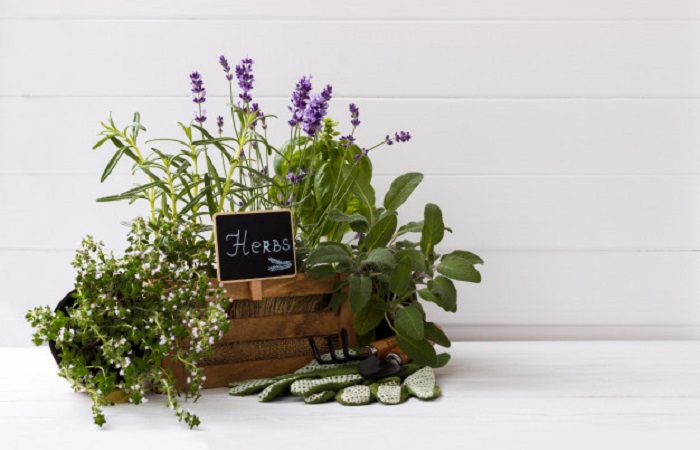We hope you love the products we recommend! Just so you know, Trendy Mami may collect a share of sales or other compensations from the links on this page.
–
If you’re the kind of person who sees the word “garden” and automatically breaks out into hives because a green thumb is the last thing you can brag about having, please don’t use that as an excuse to not read this all the way through. Even if you’re not that good when it comes to planting things, you can come off like a pro when it comes to creating your own indoor herbal garden. (No, really.)
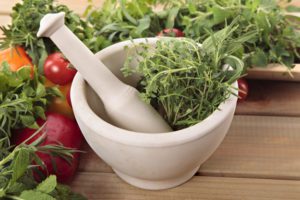
And just think. Aside from how absolutely amazing your homemade dishes will be once you add some fresh herbs to them, there are so many reasons why herbs are great for your health as well. Parsley helps to reduce cancer. Anise strengthens your immune system. Basil keeps your heart strong. Thyme can help to speed up the healing of a cold. Sage works to keep you emotionally balanced. Lastly, cilantro is a great anti-inflammatory superfood and can be grown year round!
The taste and benefits alone should serve as enough motivation to at least give the whole indoor herb garden thing a shot, right? We couldn’t agree more!
But first, if you’re looking to sharpen and grow your gardening knowledge, definitely check out Skillshare. They offer a ton of courses on all different types of subjects, including gardening, for both beginners and the more advanced stuff.
Without further ado, here’s what you need to do…

Know what kind of herbs are best.
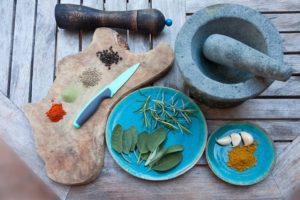
Sometimes, indoor gardening doesn’t go as planned because we start off with the wrong seeds or plants to begin with. And by “wrong”, we mean the ones that are more ideal in the outdoor air. Keeping this in mind, if you are a newbie to creating indoor gardens, start with herbs that you know are proven to do well in an indoor setting. Some of those include basil, mint, oregano, rosemary, parsley, chives, sage, and thyme.
For a variety of seeds, bulbs, and other gardening necessities, be sure to check out Sam’s Club. This is a great one-stop shop for people starting out.
Pick the best lighting for your herbs.
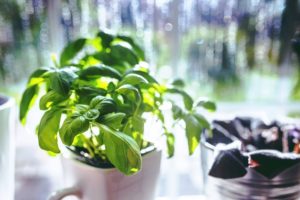
The right lightning is definitely essential in order for your herbs to thrive. In fact, the more light you’re able to give your growing herbs, the better off they’ll be (the stronger-tasting they will be too!). Your best bet would be to place them in a southern-facing window for about 6-8 hours a day. If providing this kind of natural light is a challenge, place your herbs in front of a compact fluorescent lamp instead.
Set your electronic thermostat.
The right—or wrong—temperature literally means life or death for your indoor-growing herbs. If you want them to feel totally comfortable in your home, set your thermostat to somewhere between 60-67 degrees.
Get the “drainage” right.
All plants need water; herbs included. But when you’re in the process of growing your herbs, you can actually give them too much of a good thing. Since the key to “good watering” is to let your herbs’ pots somewhat dry out in between watering, place your herbs in pots that contain drainage holes at the bottom, water your herbs slowly and try to do this no more than 2-3 times a week.
And the soil.
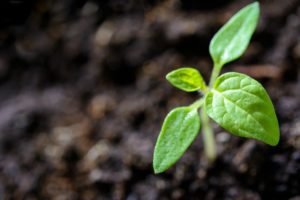
If you’ve never done any sort of gardening work, you may think that “dirt is dirt”; that the kind of soil that you choose for your herbs doesn’t matter very much. That actually couldn’t be further from the truth. If while you’re out looking for soil you see packages that say “potting soil” and others that say “potting mix”, opt for potting mix. It’s lighter and contains an aerator (something that encourages air circulation) like perilite (the little white things that you sometimes see in soil). It’s just the kind of soil that your herbs need.
When it comes to starting your own herb garden, paying attention to the soil is crucial. Thumbtack can connect you with skilled gardeners who understand the importance of soil composition, ensuring your herbs thrive naturally. Take the guesswork out of gardening with Thumbtack’s reliable services.
Give your herb garden some seaweed.
While we’re on the topic of soil, something else that your herbs will need is fertilizer. Either go with fish emulsion or, our personal favorite, seaweed extract. Both contain more nitrogen than other fertilizers do. And when your herbs get more nitrogen, their leaves end up getting much stronger.
And their own pot.
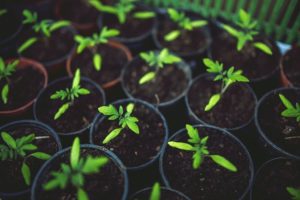
Herbs need their own space. That’s why it’s important to give each one their very own pot. The main reason is because different plants have different watering requirements. For instance, parsley and chives require more water than a lot of other herbs do. (Speak with someone at a nursery if you want specific details on this.)
Make sure your herbs get some space.
If there is such a thing as a “rude herb”, mint would have to be it. It’s actually pretty notorious for overtaking and overcrowding other plants. That’s why it’s also a good idea to make sure each potted herb gets a nice amount of its own space too. If you find yourself running out of space at home, vertical gardening is your solution!
Watch some YouTube videos.

Even though we think we’ve provided you with a pretty good cheat sheet for planting an indoor herb garden, there is still a ton of other information to learn in order to be a master gardener. Luckily, there are PLENTY of free videos to watch on YouTube. A great one to check out when you get a chance comes from the channel Garden Answer. It’s got six tips for how to deal with a struggling indoor herb garden. And don’t forget to take notes!
Love on them daily.
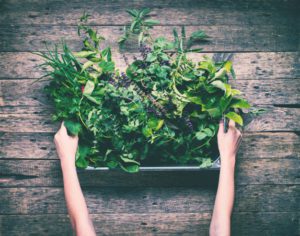
All living things need love and, believe it or not, it’s actually scientifically proven that you should love your plants by talking to them. That’s why we’re ending this article on this note. After you’ve done everything else, greet your indoor herb garden with a hello. Tell it how good it’s doing. It might feel crazy at first, but hey—if it’s gonna get your herbs to grow, it can’t hurt. Not at all.

